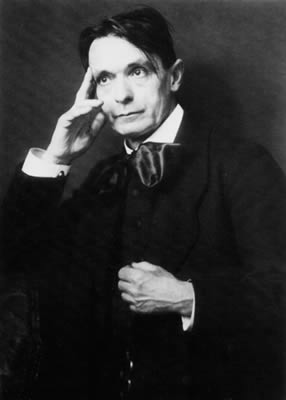
Rudolf Steiner, 1861-1925, was one of the most prolific esoteric authors of the 20th century.
He began with a technical education in Austria, then became a Goethe scholar, writer and editor with active participation in German cultural life. Around 1901 clairvoyant abilities started manifesting in his life and he started directly perceiving the world as composed of living thought. Steiner based his esoteric writings on insights acquired through these perceptions. Christ occupied a central place in Steiner’s esoteric thought but his perceptions of Christ were personal and did not draw on tradition of his time.
Steiner is best known for his work on education. He started the Waldorf school system and wrote extensively on the development of children. In Steiner’s words, the greatest accomplishment of man takes place during the 2-3 first years, when he acquires mastery of body, thought and speech.
Steiner introduced the biodynamic method of farming, represented by the Demeter label. Steiner also contributed to medicine and anthroposophic medicine is practiced in many countries of Europe as an adjunct to conventional medicine.
Steiner was for a time the secretary of the German branch of the Theosophical Society but left this due to controversy on the role of Christ in order to found the Anthroposophical Society in 1913.
Steiner’s body of esoteric writings covers the following themes:
Karma - Steiner saw as one of his main tasks the reintroduction of the concept of karma into Western thought. Steiner’s lectures on karma include many case studies where he analyzes the karmic histories of well known personages as seen through his psychic faculties. Steiner presents many laws and regularities which mediate between lives, extensively discusses the between lives stage and phenomena of mediumship and the nature of time, space and perception at these various levels.
Esoteric History - Steiner writes about multiple world ages, including Atlantean, Old Indian, Old Persion, Egypto-Chaldean, Greco-Roman and Christian. Steiner sees various planetary spirits taking turns influencing the spiritual and material life of humanity by working through diverse individuals and ethnoi. The esoteric history starts with a progressive fall of spirit into more and more congealed and mechanical forms, which by his time had attained a high degree of mechanicality and disconnection from source. This trend was to turn around towards the latter part of the 20th century. Steiner makes vague references to qualitative changes in the future but it is hard to tell whether he was conscious of anything corresponding to the concept of the Wave as discussed in this work.
Spiritual Development - Steiner prescribes various exercises aimed at raising consciousness and developing faculties of clairvoyance. The terminology is different but the concepts can be mapped to many 4th Way ideas, such as using the centers for their intended purpose instead of their customary anarchy, building faculties of attention, having discipline and striving for objectivity instead of reveling in imagination and subjective experiences.
The principal differences between Steiner and Gurdjieff have to do with the fact that Steiner writes as if man in general had a persistent soul and experienced reincarnation as a matter of course. Steiner also has a system of non-physical bodies but again he sees these as naturally occurring and not as something to be specially built by conscious efforts. For example the authors mean something quite different with the word “astral body”. Steiner does not directly speak of man feeding the moon but does recognize a sort of cosmic struggle taking place through man, reflected in the spiritual influences guiding the ages.
Steiner has over 100 publications to his name and there are additionally thousands of recorded lectures by him, including:
- Theory of Knowledge Implicit in Goethe’s World-Conception (1886)
- Mysticism at the Dawn of Modern Age (1901/1925)
- Christianity as Mystical Fact (1902)
- How to Know Higher Worlds: A Modern Path of Initiation (1904–5)
- True and False Paths in Spiritual Investigation (eleven lectures, 1924)
- Fundamentals of Therapy: An Extension of the Art of Healing Through Spiritual Knowledge (1925)
